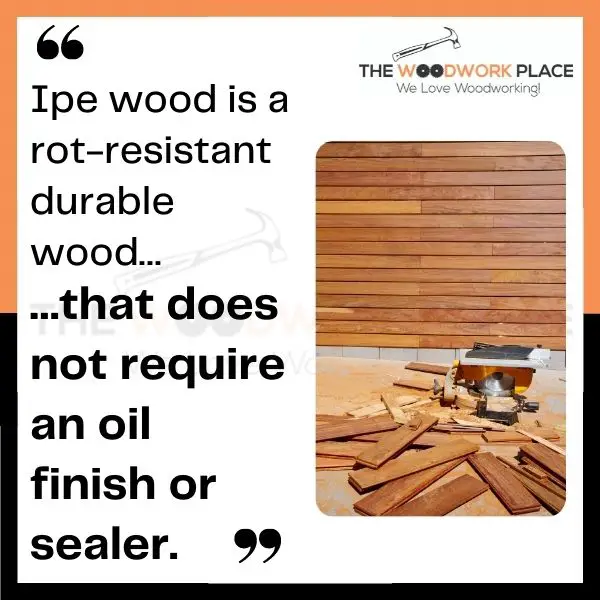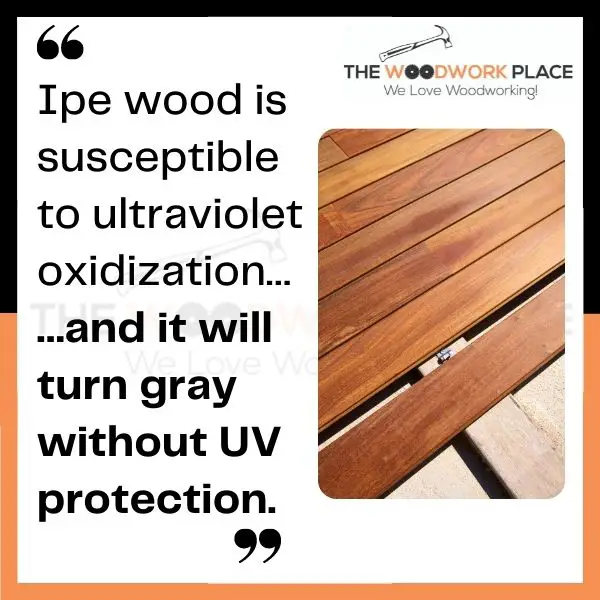Teak oil can bring out the beauty of wooden furniture—without masking any of its natural texture.
Not only that, a coat of Teak oil can prevent UV weathering. Which is one of the reasons why this oil pairs so well with Teak wood decking.
Yet Teak oil isn’t suitable for every type of outdoor timber, case in point, Ipe wood.
This Brazilian hardwood, (also known as the Brazilian Walnut), is an incredibly sturdy and strong lumber. Primarily utilized for outdoor applications, Ipe is commonly used for everything from decking to siding.
This pricey lumber is so naturally long-lived, that it doesn’t need oil treatments, preservatives, or even a waterproofing sealant.
Which begs the question… why would Ipe need a coat of Teak oil at all?
Well, in this post, you will learn exactly why Ipe wood is so durable…and how this can hinder Teak oils ability to soak into this hardwood. You will also learn what actually goes into Teak oil…and what the real connection is to its namesake.
And we reveal the best penetrating oil finish for Ipe wood…one that’s been specially formulated for this tropical lumber.
So, let’s get started…

This post may contain affiliate links to products that we receive a commission for (at no additional cost to you). Learn more here.
What Is Teak Oil?
Teak oil is a penetrating oil finish that works just like Linseed oil and Tung oil. It will beautify wood grain, and preserve it from rot and decay.
But, unlike Linseed oil and Tung oil, Teak oil is not a natural product. And its a popular misconception that Teak oil comes from Teak wood.
Instead, this oil finish is made from a blend of different ingredients, mixing natural oils with thinners, varnish and UV inhibitors.
The only thing Teak oil shares with Teak wood is its name. And that’s because Teak oil was originally created as an oil finish for Teak wood.
You see, Teak wood is a very durable wood too. And this is due to the fact that it is filled to the brim with its own natural oils. And, just like Ipe wood, Teak wood doesn’t need an oil finish or sealer either.
But, what Teak oil brings to the table is UV-protection. And without that protection, Teak wood would turn gray over time.
Related Post: Should You Use Teak Oil On Cedar Wood? (Best Practice Revealed) | TheWoodworkPlace.com
Can You Use Teak Oil On Any Non Teak Wood?
If that wooden surface can take a coat of Linseed oil, then it can take a coat of Teak oil too. However, the key thing to remember is that Teak oils main job is to safeguard wood from the effects of UV weathering.
Otherwise, Teak oil is not a waterproof finish, and it will need to be reapplied at least once a year.

Does Ipe Wood Need UV Protection (Just Like Teak Wood)?
Ipe wood is just as durable as Teak wood. However, while Teak wood gets much of its durability due to its natural oiliness, Ipe wood’s durability comes from it’s incredible density.
It’s so dense, even water droplets struggle to soak into the grain of this hardwood (although Ipe can absorb moisture in highly humid environments).
However, UV weathering can be a problem for Ipe furniture and decking. And UV rays will oxidize Ipe wood, turning it from a reddish brown into an ashy gray color.
But, coating Ipe wood with a UV-inhibiting oil will prevent this from happening.
In short, Ipe wood suffers from UV oxidization the same way that Teak wood does. So, it will also need UV-protection.
What Is UV Oxidization? In the case of wood, it’s when intense ultraviolet rays break down the chemical bonds of woods organic compounds.
Does Teak Oil Change Ipe Woods Color And Make It Darker?
It depends on the brand of Teak oil.
There is no industry-standard Teak oil recipe, so the balance of ingredients can change from brand to brand. Still, since many Teak oil products may contain Linseed oil, then it can be safe to assume that Teak oil will also darken wood.
This is because Linseed oil naturally darkens wood over time.

Graying Aside…Why Is Ipe Wood So Durable Anyway?
It’s because Ipe wood is so dense. In fact, Ipe wood is so compact, that even fire struggles to consume it.
According to the Janka Hardness Scale, (which measures the density of wood), Ipe is three and a half times denser than Walnut wood. Walnut has a Janka rating of 1010 lbf, which means it takes 1010 pounds of force to dent this hardwood.
Related Post: What Is The Best Finish For A Walnut Table? (Solved!) | TheWoodworkPlace.com
Ipe, on the other hand, has a Janka rating of 3510 lbf. So, it would take a jaw-dropping 3510 pounds of force to even so much as scratch the surface of Ipe wood!
And this high density makes Ipe much stronger and fire resistant than other types of wood.
What is the Janka Hardness Scale? This scale measures how much force it takes to make a dent in a piece of wood. The higher a woods Janka rating, the more pounds of force it takes to make a dent.
Great! Can I Go Ahead And Use Teak Oil On Ipe Outdoor Furniture?
First off, it’s worth repeating that, this wood does not need any protective oil finish. It can last untreated for decades…even when its been left outside.
However, if you want to prevent it from turning gray, then you need a UV inhibiting oil finish. The oil will intensify the appearance of this lumber, as well as protect it from harsh sunlight all-year-round.
Now, while Teak oil can protect wood from UV-damage, this oil is not suitable for Ipe wood.
You see, Ipe wood is very dense and solid, and it is 3 times more solid than Teak wood (which has a Janka rating of 1155 lbf). This is why it can be tricky getting your typical off-the-shelf penetrating oil finish to soak deeply into Ipe.
This tough wood needs a finish that is specially designed to soak into near-impenetrable tropical hardwoods…
Related Post: Don’t Use Ipe Wood For Your Cutting Board (Here’s Why)
…So What Is The Best Oil For Ipe Wood Decking And Furniture?
The best oil for Ipe wood furniture and decking is Penofin Hardwood Formula Penetrating Oil. This oil finish has been specially created to sink right down into very dense hardwoods.
A single coat of oil will give Ipe wood full UV protective coverage, while at the same time enhancing this timbers natural beauty. In addition to that, this finish is also mildew resistant.
Containing Brazilian Rosewood oil, (that has been sustainably sourced), this clear oil finish won’t darken Ipe woods natural color either.
To find out the latest prices for this oil finish check out Amazon.com
Also, full disclosure, this product cannot be purchased in, (or shipped to any address in), California, USA.
To Wrap Up, Here Are The 3 Key Takeaways From This Post…
- 1). Ipe wood is a rot-resistant durable wood that does not require an oil finish or sealer.
- 2). Ipe wood is susceptible to ultraviolet oxidization, and it will turn gray without UV protection.
- 3). Ipe wood is so dense that off-the-shelf Teak oil cannot sink deeply enough into this hardwood.
References:
Photodegradation and photostabilization of polymers, especially polystyrene.
Makovicka Osvaldova, Linda, Patricia Kadlicova, and Jozef Rychly. “Fire characteristics of selected tropical woods without and with fire retardant.” Coatings 10.6 (2020): 527.



